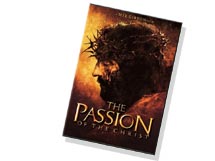Big media and the "holy" grail
2006 may be the year when more media firms find religion. Why? Because that's where the money is.
NEW YORK (CNNMoney.com) � Is sin no longer in? Sure, sex and violence still sell in mainstream media. Don't get me wrong. I can appreciate the uh, talents, of Jessica Alba or a movie with a good car chase as much as the next guy. But increasingly, people want to see more than just scantily clad women and loud explosions. They want to find religion.
I've written several stories about why there was a box-office slump in 2005. And several readers have e-mailed me to say that they think the biggest reason for the downturn is that Hollywood is out of touch with what many people want. "Hollywood makes few family movies anymore," one reader wrote. "I wish someone in Hollywood would realize it is the story, not just the special effects that makes event movies blockbusters," lamented another reader. With that in mind, I think 2006 is going to be a year when more major media firms try to tap into a growing trend: increased interest in religious-themed content. But let's not praise major media companies too much if they become more family-friendly. They are simply going to adapt in order to capture more of what is most holy to them: the almighty dollar. Think about it. "The Chronicles of Narnia: The Lion, the Witch and the Wardrobe," has been a huge hit for Walt Disney (Research), grossing nearly $250 million in the U.S. since it was released last month, according to movie tracking firm Box Office Mojo. The monstrous success of this movie was a surprise to some who thought that moviegoers might be scared off by the film's religious message. After all, C.S. Lewis' "Narnia" books were Christian allegories that weren't exactly thinly veiled. Turned out that the nay-sayers were wrong, just as they were when they doubted how well Mel Gibson's "The Passion of the Christ" would do when it came out in 2004. And "Narnia" is far from being the only example of media firms profiting from religion. Dan Brown's best-seller "The Da Vinci Code" has tapped into a growing fascination about the inner-workings of the Catholic Church and the lives of Jesus Christ and Mary Magdalene. "The Da Vinci Code" has reaped immense rewards for its publisher Doubleday, which is owned by German media conglomerate Bertelsmann. The book has been on The New York Times hardcover best-seller list for the past 145 weeks. And this week, Doubleday sister firm Random House announced that a paperback version will finally be released in the U.S. in March as a tie-in for the upcoming movie. The film adaptation, directed by Ron Howard and starring Tom Hanks, will be released in May by Sony's (Research) Columbia Pictures. It is widely expected to be one of the bigger blockbusters of the year. The religious stocks
There are even several publicly traded media firms that rely heavily on religious content. And they actually have done quite well. Shares of Thomas Nelson (Research), which publishes Bibles and other Christian-themed books, were up more than 10 percent in 2005, outperforming mainstream book publishing stocks such as Scholastic (Research) and Pearson (Research). What's more, analysts expect earnings in the company's most recent quarter, which ended in December, to be up 25 percent from a year earlier on a 14 percent increase in sales. There's also Salem Communications (Research), a radio broadcaster that focuses mainly on Christian music and other religious content. Analysts are forecasting a revenue increase of more than 7 percent in 2006, a growth rate higher than most large radio firms. And profits are expected to be up 33 percent. Other broadcasters have taken notice. The radio industry's largest player, Clear Channel Communications (Research), recently changed the format of one of its FM stations in Austin from rock music to contemporary Christian music. According to the station's new Web site, the station, now known as The River, is "a different kind of station that aspires to a different set of values" and features the following tag line: The River, 'Positive Music, Safe for the Entire Family.' Of course, other large media companies aren't ignoring religion entirely either. The publishing arms of both News Corp. (Research) and Time Warner (Research) have sizable religious or faith-oriented imprints, for example. (Time Warner also owns CNNMoney.com) But the big media companies also have to be careful to not alienate their audience. Even though the controversy surrounding the "The Da Vinci Code," which doesn't cast leaders of the Catholic Church in a positive light, hasn't hurt book sales, negative publicity doesn't appear to be helping NBC and its new TV show "The Book of Daniel." NBC, owned by conglomerate General Electric (Research), is reported to be having problems finding advertisers for the show, which is about a Vicodin-addicted priest (who has "conversations" with Jesus) and his dysfunctional family. And several NBC affiliates have refused to air "Daniel," which debuted last Friday to tepid reviews and poor ratings. It just goes to show that while there is healthy demand for more TV shows, movies, books, and music with religious themes, people don't want to have their faith mocked. Religion, after all, is a touchy subject. For a look back at Hollywood's disappointing year, click here. For more about News Corp, in addition to Disney, will benefit from Narnia-mania, click here. -----------------------------------------------------------------
The reporter of this story owns shares of Time Warner through his company's 401(k) plan. |
| |||||||||||||||||||||||||||||||||||||||||||||||||||||||||||||||||||||||||||||||||||||||||||||||||||||||||||||||||||||




